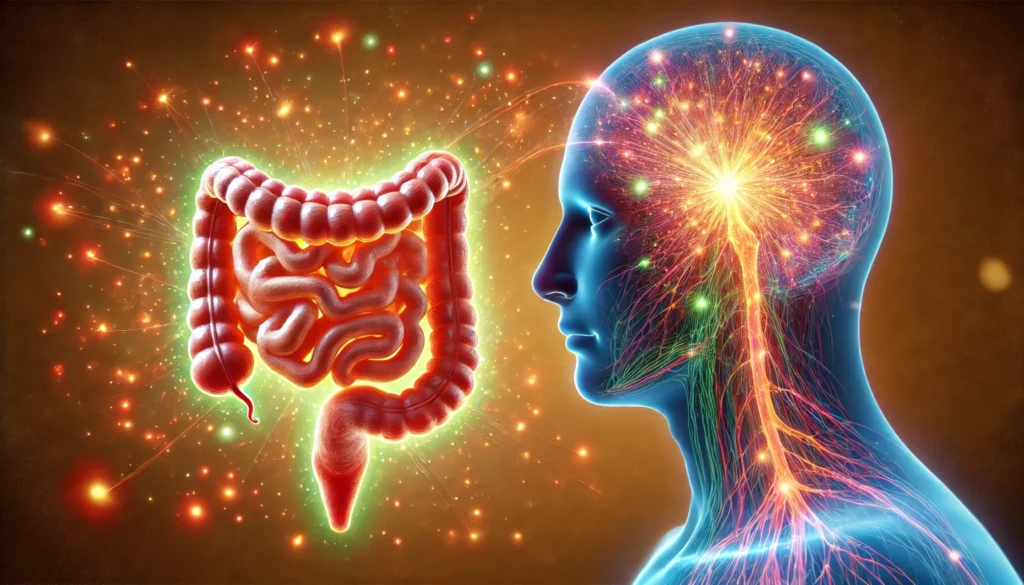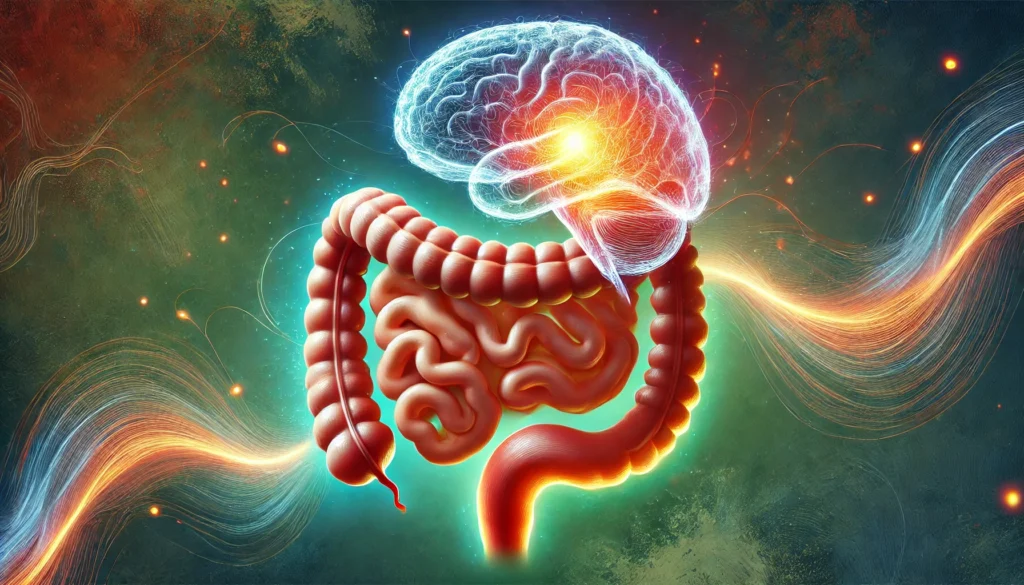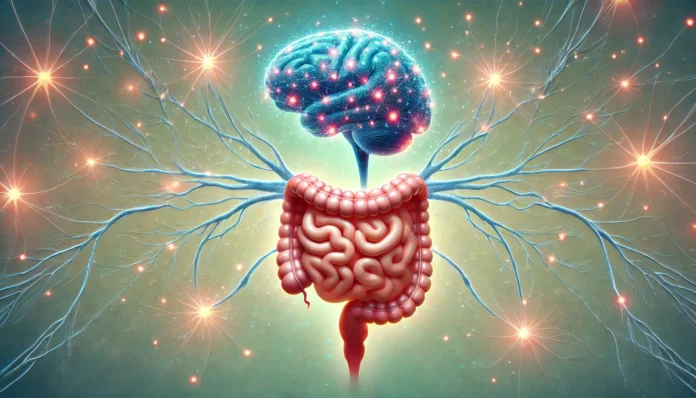Understanding the Gut-Brain Connection
For centuries, the human gut has been primarily viewed as the body’s digestive system, responsible for breaking down food and absorbing nutrients. However, emerging scientific research has revealed that the gut plays a much more profound role in overall health, extending beyond digestion to directly influence mental well-being. This intricate connection, often referred to as the gut-brain axis, highlights how gastrointestinal health can impact cognitive functions, mood regulation, and even mental health disorders.
You may also like: How to Improve Gut Health Naturally: Science-Backed Tips for a Stronger Microbiome
The gut-brain axis is a bidirectional communication network linking the central nervous system and the gastrointestinal system. This interaction is facilitated by neural pathways, immune responses, and biochemical signaling involving neurotransmitters and hormones. The gut microbiota—the trillions of bacteria residing in the digestive tract—play a critical role in modulating this communication, affecting everything from stress responses to cognitive processes. Understanding where your gut fits into overall health is crucial for developing strategies to optimize digestion health and promote mental clarity.
The Role of Gut Microbiota in Mental Health
The gut microbiota comprises a diverse ecosystem of bacteria, fungi, viruses, and other microorganisms, many of which are essential for maintaining digestion health. These microbes assist in breaking down complex carbohydrates, synthesizing essential vitamins, and producing short-chain fatty acids that support gut integrity. However, their role extends far beyond digestion. Research has shown that a balanced gut microbiome contributes to mental well-being by influencing neurotransmitter production, such as serotonin and dopamine, which regulate mood and cognition.
A disrupted gut microbiota—often due to poor dietary choices, chronic stress, or antibiotic use—can lead to an imbalance known as dysbiosis. This condition has been linked to various mental health disorders, including anxiety, depression, and even neurodegenerative diseases. The presence of harmful bacteria in the gastrointestinal tract can trigger inflammation, disrupt neural communication, and compromise overall GI health. Restoring a balanced microbiota through dietary interventions and probiotic supplementation is increasingly being recognized as a strategy to improve mental resilience.
Inflammation and Its Effects on Cognitive Function
Chronic inflammation is a major factor linking gastrointestinal health to mental well-being. The gut lining serves as a barrier that prevents harmful substances, such as toxins and pathogens, from entering the bloodstream. However, when the gut barrier is compromised due to poor dietary habits, infections, or chronic stress, it can result in a condition known as leaky gut syndrome. This condition allows inflammatory molecules to enter circulation, triggering systemic inflammation that can reach the brain.
Neuroinflammation, or inflammation of brain tissue, has been implicated in various cognitive disorders, including Alzheimer’s disease, depression, and anxiety. When the immune system is chronically activated, it can lead to neuronal damage, impaired synaptic function, and cognitive decline. Therefore, maintaining gut health by consuming anti-inflammatory foods, such as leafy greens, fatty fish, and fermented products, can help reduce inflammation and support cognitive function.
Nutrient Absorption and Its Impact on Brain Function
Proper nutrient absorption is essential for cognitive performance and emotional stability. The gut plays a vital role in breaking down food and assimilating nutrients that are necessary for brain health. Key nutrients, such as B vitamins, omega-3 fatty acids, magnesium, and antioxidants, contribute to neurotransmitter synthesis, neuronal repair, and neuroplasticity. If gastrointestinal health is compromised, the absorption of these critical nutrients can be impaired, leading to deficiencies that may affect mental clarity, memory, and mood stability.
Conditions such as irritable bowel syndrome (IBS), Crohn’s disease, and celiac disease can interfere with nutrient uptake, further exacerbating cognitive symptoms. Addressing underlying gut health issues through targeted dietary interventions and lifestyle modifications can significantly enhance brain function and emotional resilience.

Stress and the Gut: A Two-Way Interaction
Stress is both a cause and consequence of poor GI health. Psychological stress triggers the release of cortisol and other stress hormones, which can disrupt gut motility, alter microbial composition, and increase intestinal permeability. This stress-induced gut imbalance can manifest as bloating, indigestion, or irritable bowel syndrome, further exacerbating anxiety and depression symptoms.
Conversely, an imbalanced gut microbiota can make the brain more susceptible to stress by reducing the production of calming neurotransmitters such as gamma-aminobutyric acid (GABA). This bidirectional relationship highlights the importance of managing stress through practices such as mindfulness, meditation, and proper nutrition to maintain both gastrointestinal health and mental well-being.
Strategies to Improve Gut and Mental Health
Optimizing digestion health to support cognitive function involves a combination of dietary, lifestyle, and therapeutic interventions. Consuming a fiber-rich diet with prebiotics, which feed beneficial gut bacteria, is essential for maintaining a healthy microbiome. Foods such as garlic, onions, bananas, and asparagus promote microbial diversity and enhance gut function.
Additionally, incorporating probiotic-rich foods, including yogurt, kefir, sauerkraut, and kimchi, can help replenish beneficial bacteria and restore balance within the gut. Reducing the intake of processed foods, artificial sweeteners, and excessive alcohol can further support GI health and reduce inflammation.
Regular physical activity, adequate hydration, and stress management techniques also play a crucial role in maintaining digestive health. Exercise has been shown to enhance gut motility, reduce inflammation, and positively impact microbiota composition. Likewise, engaging in stress-reduction activities such as deep breathing, yoga, and cognitive behavioral therapy can mitigate the harmful effects of stress on both the gut and brain.
The Future of Gut-Brain Research
As scientific understanding of the gut-brain axis continues to evolve, new therapeutic approaches are emerging to address mental health conditions through gastrointestinal interventions. Personalized nutrition, microbiome-based treatments, and gut-directed therapies are gaining traction as viable strategies for enhancing cognitive well-being. The potential to manipulate gut bacteria through targeted probiotics, fecal microbiota transplants, and precision medicine offers promising avenues for the treatment of mental health disorders.
Researchers are also exploring the role of psychobiotics—probiotics with specific mental health benefits—in regulating mood and cognitive function. The growing recognition of the gut as a key player in mental health underscores the need for an integrative approach that considers digestion health as an essential component of overall wellness.

Frequently Asked Questions (FAQ) on the Gut-Brain Connection
1. How does gastrointestinal health influence mood and emotions?
Gastrointestinal health has a profound impact on mood and emotional regulation due to its role in neurotransmitter production. The gut produces nearly 90% of the body’s serotonin, a neurotransmitter responsible for happiness and emotional balance. An imbalance in the gut microbiota can lead to reduced serotonin levels, increasing the risk of depression and anxiety. Additionally, a disrupted gut lining can allow harmful inflammatory molecules to enter the bloodstream, negatively affecting brain chemistry. By maintaining a healthy gut through proper nutrition and lifestyle choices, individuals can support their emotional well-being and reduce the likelihood of mood disorders.
2. Can poor digestion health lead to cognitive decline?
Yes, poor digestion health can contribute to cognitive decline over time. When the gut struggles to properly break down food and absorb essential nutrients, the brain may experience deficiencies in vitamins and minerals crucial for cognitive function. Chronic inflammation stemming from poor GI health can also accelerate neurodegenerative conditions such as Alzheimer’s disease. Studies suggest that maintaining a balanced gut microbiota can enhance memory retention and overall cognitive performance. Prioritizing a gut-friendly diet, rich in fiber and fermented foods, can help safeguard cognitive health as individuals age.
3. Where is your gut in relation to the nervous system, and why does it matter?
Your gut is directly connected to the central nervous system through the vagus nerve, a critical communication pathway between the brain and digestive system. This connection allows the gut to send signals that influence stress responses, mood, and even decision-making. Disruptions in gut health can impair this communication, leading to increased stress, anxiety, and even cognitive fog. Researchers are exploring how strengthening this gut-brain connection through mindful eating and probiotic supplementation can improve mental resilience. Understanding the physical location and function of the gut within the body highlights its importance in both mental and physical health.
4. How does stress impact GI health, and can it be managed?
Stress triggers the release of cortisol and other hormones that can disrupt GI health by altering gut motility and increasing intestinal permeability. Chronic stress often leads to digestive issues such as bloating, acid reflux, and irritable bowel syndrome. The gut microbiome also changes under stress, sometimes favoring harmful bacteria over beneficial ones. Managing stress through meditation, deep breathing exercises, and maintaining a balanced diet can help restore gut health. Emerging research suggests that psychobiotics—probiotics with mental health benefits—may play a role in mitigating stress-related digestive disturbances.
5. What role do prebiotics and probiotics play in supporting gut-brain health?
Prebiotics and probiotics are essential for maintaining a diverse and balanced gut microbiome, which directly influences brain health. Prebiotics are non-digestible fibers that feed beneficial gut bacteria, promoting their growth and enhancing digestion health. Probiotics introduce live beneficial bacteria into the gut, helping restore microbial balance, especially after antibiotic use or dietary imbalances. Recent studies suggest that specific probiotic strains may help alleviate symptoms of depression and anxiety by modulating neurotransmitter activity. Incorporating a combination of prebiotic-rich foods, such as garlic and asparagus, along with fermented probiotic foods like yogurt and kimchi, can optimize gut-brain health.
6. Can certain dietary habits improve both GI health and mental well-being?
Absolutely. A diet rich in whole foods, fiber, and fermented products has been shown to improve both GI health and mental well-being. Omega-3 fatty acids, found in fatty fish, support brain function while reducing gut inflammation. Antioxidant-rich foods, such as berries and dark chocolate, help combat oxidative stress that can negatively impact digestion health and cognitive performance. Eliminating processed foods and excessive sugar intake can also prevent dysbiosis, the imbalance of gut bacteria that may contribute to depression and anxiety. By aligning dietary choices with gut health goals, individuals can improve their mood, cognitive clarity, and overall wellness.
7. How does exercise affect the gut-brain connection?
Exercise has a significant impact on the gut-brain axis by enhancing both digestion health and mental function. Physical activity increases gut motility, reducing issues such as constipation and bloating. It also stimulates the production of short-chain fatty acids, which are beneficial for maintaining gut lining integrity. Additionally, exercise promotes the release of endorphins, neurotransmitters that boost mood and reduce stress-related gut disturbances. Studies indicate that regular movement, such as walking or yoga, can help cultivate a healthier gut microbiome while simultaneously improving cognitive focus and emotional balance.
8. Are there medical conditions that disrupt GI health and contribute to mental health issues?
Several medical conditions can simultaneously impact GI health and mental well-being. Irritable bowel syndrome (IBS), for example, is often linked to anxiety and depression due to disruptions in gut motility and microbiota imbalances. Autoimmune disorders, such as Crohn’s disease and ulcerative colitis, can cause chronic inflammation, which may lead to fatigue and cognitive impairments. Even conditions like small intestinal bacterial overgrowth (SIBO) can contribute to mood fluctuations by affecting neurotransmitter levels. Seeking medical guidance for persistent digestive issues can help individuals manage both their gut and mental health more effectively.
9. How does sleep quality influence gastrointestinal health and cognitive performance?
Sleep quality plays a crucial role in both gastrointestinal health and cognitive performance. Poor sleep can lead to an imbalance in gut bacteria, increasing the risk of inflammation and digestion issues. Additionally, inadequate rest disrupts the body’s ability to regulate stress hormones, which can negatively impact gut-brain communication. Studies show that individuals with sleep disorders often experience higher levels of anxiety and gut-related discomfort. Implementing good sleep hygiene, such as maintaining a consistent bedtime and reducing screen exposure before bed, can enhance gut health and mental clarity.
10. What future research is being conducted on the gut-brain axis?
The field of gut-brain research is rapidly expanding, with scientists exploring new ways to harness gastrointestinal health for mental well-being. Researchers are investigating how personalized nutrition can optimize gut microbiota to target mental health conditions such as depression and anxiety. The potential use of fecal microbiota transplants (FMT) as a treatment for cognitive disorders is also being explored. Additionally, advancements in microbiome testing may allow for more precise interventions tailored to an individual’s gut composition. As the connection between digestion health and mental well-being becomes clearer, the future of gut-directed therapies holds promise for improving overall quality of life.

Conclusion: Prioritizing Gut Health for Mental Well-Being
The intricate relationship between the gut and the brain highlights the importance of prioritizing gastrointestinal health to support cognitive function and emotional balance. By nurturing a healthy microbiome, reducing inflammation, and optimizing nutrient absorption, individuals can improve their mental well-being and resilience against stress. Understanding where your gut fits into the broader context of overall health empowers individuals to make informed lifestyle choices that promote both physical and psychological wellness.
As research continues to unveil the complexities of the gut-brain connection, integrating gut-friendly dietary and lifestyle habits remains a fundamental strategy for enhancing mental clarity, emotional stability, and long-term cognitive health. By recognizing the pivotal role of GI health in mental well-being, individuals can take proactive steps to foster a balanced, thriving gut microbiome that supports both body and mind.
gut microbiome balance, digestive system and mental health, brain-gut connection, probiotics for brain health, gut bacteria and mood, inflammation and mental clarity, microbiota and cognitive function, leaky gut and anxiety, serotonin production in the gut, diet for gut health, prebiotics for digestion, gut-friendly foods, mind-gut wellness, fermented foods for mental well-being, holistic gut health, gut barrier function, stress and digestive health, neuroinflammation and cognition, gut healing strategies, lifestyle for gut-brain balance
Further Reading:
The Gut-Brain Axis: Influence of Microbiota on Mood and Mental Health
Disclaimer
The information contained in this article is provided for general informational purposes only and is not intended to serve as medical, legal, or professional advice. While Health11News strives to present accurate, up-to-date, and reliable content, no warranty or guarantee, expressed or implied, is made regarding the completeness, accuracy, or adequacy of the information provided. Readers are strongly advised to seek the guidance of a qualified healthcare provider or other relevant professionals before acting on any information contained in this article. Health11News, its authors, editors, and contributors expressly disclaim any liability for any damages, losses, or consequences arising directly or indirectly from the use, interpretation, or reliance on any information presented herein. The views and opinions expressed in this article are those of the author(s) and do not necessarily reflect the official policies or positions of Health11News.


